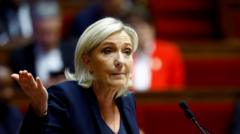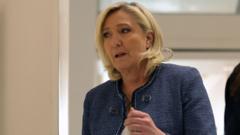Amid rising tensions, a verdict against Marine Le Pen could not only derail her political ambitions but also raises questions about the fairness of the judicial system towards right-wing parties.
**France's Political Landscape Shaken by Potential Embezzlement Verdict Against Marine Le Pen**

**France's Political Landscape Shaken by Potential Embezzlement Verdict Against Marine Le Pen**
As Marine Le Pen faces trial for embezzlement, France grapples with issues of democracy and political integrity.
The political climate in France is tense as Marine Le Pen, leader of the far-right National Rally party, awaits a verdict on charges of embezzling approximately $4.8 million in European Union funds. This trial, set to conclude with a much-anticipated ruling on Monday, is perceived not only as a legal examination but also as a referendum on the integrity of French democracy in the face of a surging far-right movement.
Le Pen, who has previously attempted to ascend to the presidency three times, asserts that a guilty verdict would equate to a "political death" sentence for her and her party. She frames the potential ruling as a significant blow to the electorate's will, suggesting that it signals deeper dysfunction within the French political system. The upcoming decision has the potential to spark widespread unrest, given the current societal anxieties regarding the balance of political power and representation.
In legal arguments presented, prosecutor Nicolas Barret emphasized the importance of upholding the law, declaring that justice should prevail over political considerations. This assertion underscores the principle that all individuals, regardless of their political affiliations, are subject to the same legal standards. However, some politicians, including former interior minister Gérald Darmanin, have voiced concerns that a ban on Le Pen could set a dangerous precedent, undermining the democratic process and enhancing public distrust in judicial fairness. Darmanin articulated that political conflicts should be resolved at the ballot box rather than through judicial means.
Over the past few years, Le Pen has worked to reposition her party, previously associated with far-right extremism and antisemitism, to a more mainstream platform focused on anti-immigrant sentiments. Under her leadership, the National Rally has grown in political power, now claiming 123 seats in the National Assembly, making it the largest party in that body.
As the nation prepares for the verdict, the potential implications stretch beyond Le Pen's future, signaling a pivotal moment in managing the dynamics of power, legality, and public sentiment in contemporary France.
Le Pen, who has previously attempted to ascend to the presidency three times, asserts that a guilty verdict would equate to a "political death" sentence for her and her party. She frames the potential ruling as a significant blow to the electorate's will, suggesting that it signals deeper dysfunction within the French political system. The upcoming decision has the potential to spark widespread unrest, given the current societal anxieties regarding the balance of political power and representation.
In legal arguments presented, prosecutor Nicolas Barret emphasized the importance of upholding the law, declaring that justice should prevail over political considerations. This assertion underscores the principle that all individuals, regardless of their political affiliations, are subject to the same legal standards. However, some politicians, including former interior minister Gérald Darmanin, have voiced concerns that a ban on Le Pen could set a dangerous precedent, undermining the democratic process and enhancing public distrust in judicial fairness. Darmanin articulated that political conflicts should be resolved at the ballot box rather than through judicial means.
Over the past few years, Le Pen has worked to reposition her party, previously associated with far-right extremism and antisemitism, to a more mainstream platform focused on anti-immigrant sentiments. Under her leadership, the National Rally has grown in political power, now claiming 123 seats in the National Assembly, making it the largest party in that body.
As the nation prepares for the verdict, the potential implications stretch beyond Le Pen's future, signaling a pivotal moment in managing the dynamics of power, legality, and public sentiment in contemporary France.





















